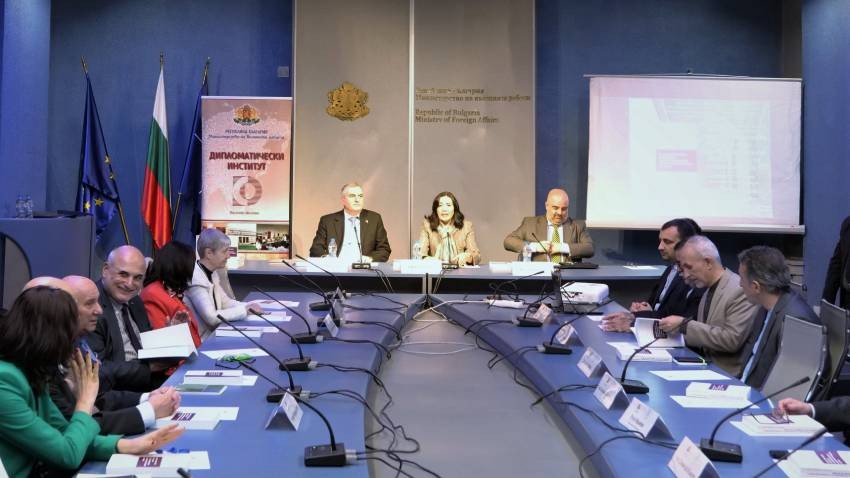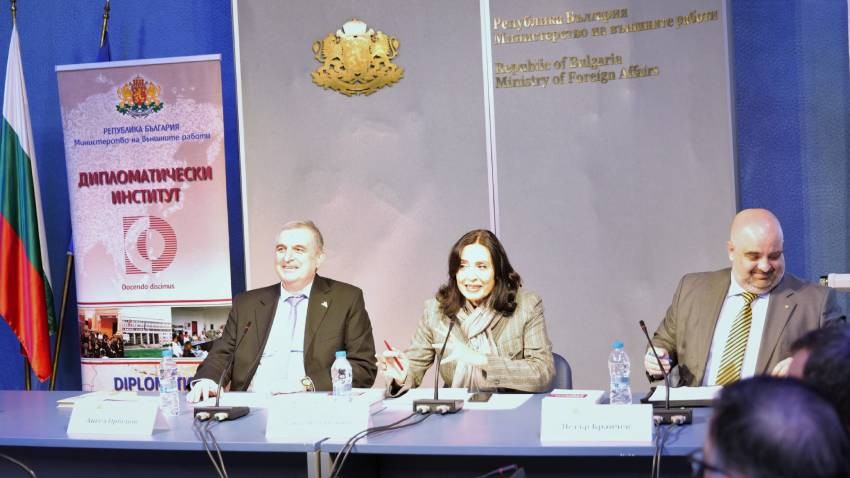Diplomatic relations between Bulgaria and the Islamic Republic of Iran have a history going back 125 years, and Bulgarian diplomat Angel Orbetsov has endeavoured to research and describe the first 8 decades of the period in his book “Bulgarian-Iranian relations from the Liberation until the late 1950s”. The author has a diplomatic career spanning 36 years, he has been ambassador to China, director of the Asia, Australia and Oceania department at the Ministry of Foreign Affairs for many years, university professor and author of a Persian language textbook for university students of Iranian studies. His book is the first comprehensive study of its kind of the relationships between Bulgaria and Iran, and the expected second part analyzing the contemporary period, will contribute to a more adequate formulation of Bulgaria’s objectives and interests with regard to Iran in view of its place in contemporary international relations. 
“There is a certain affinity between Bulgarians and Iranians, which I myself have experienced during all the years I have worked with Iran, including during my long-term secondment to that country about 30 years ago,” the diplomat says in an interview with Radio Bulgaria. “This affinity is rooted in the spiritual and cultural contacts between the two nations through the centuries, in the geopolitical location of the two countries as neighbours to the West and to the East of the Ottoman empire, against the backdrop of the problems that both countries had with it, as well as their relations at an inter-state level that now have a history going back 125 years.”
“To write this book, a great many documents were taken out of the archives and studied, and processed into a story, running over time, in an attempt at periodization, supplemented where possible with material from various sources. This includes reading, translating and presenting Iranian documents that have so far been unavailable to the Bulgarian academic community. This shed light on a number of hitherto unknown or unresearched events and processes. Let me make mention of some of them, like the Bulgarian-British accord from 1897 on issues connected with the Iranian subjects in the Principality of Bulgaria, the first Iranian diplomatic mission in this country from the late 19th and the early 20th century, the labour migration from Bulgaria to Iran in the 1930s, the interned Bulgarian subjects residing on the territory of Iran during World War II, inter-party contacts during the 50s etc. Many Bulgarian diplomats point to the benefits of cooperating with Iran. The Bulgarian legation in Iran (1939-1941), headed by diplomat Dimitar Dafinov, took concrete steps for the improvement of trade and economic relations by exporting Bulgarian products: silkworm eggs, tobacco, cement, passenger railroad cars, and importing Iranian cotton.”
One of the ambitions of the book is to ascertain the exact date of the beginning of Bulgarian-Iranian diplomatic relations:
“The date 15 November, 1897 is regarded as the start of diplomatic relations, taking as a starting point the delivery of a note for handing an agrément to the first Iranian diplomatic agent in the Principality of Bulgaria – Mirza Hossein Khan. The first Iranian diplomatic mission in Sofia functioned from 1898 until 1902, but, unfortunately, the documents available do not show the exact date it opened. And as there is no evidence of a specific act for the establishment of diplomatic relations – agreement, declaration or exchange of notes – no other date can be identified as their starting point.”
However, the researcher says that long before that the two countries had maintained official contacts via their missions in Constantinople. There was official correspondence between the monarchs, and in Ruse and Varna there were Iranian consuls, vice-consuls and honorary consuls.

“Of this correspondence, the only document that has been preserved in the Iranian archives is a copy of a letter of congratulations by the Iranian monarch on the occasion of the accession to the throne by Prince Alexander. In it, the Shah uses words of encouragement for the independent development of Bulgaria (the word “independence” is used three times in the letter), and we know well that under Article 1 of the Berlin Treaty, “Bulgaria is constituted an autonomous and tributary Principality under the suzerainty of His Imperial Majesty the Sultan”.”
Bulgaria had a colony of emigrant workers in Iran before and during World War II. What happened to these Bulgarians after diplomatic relations were severed in 1941, after the Allies (USSR and Great Britain) entered Persia and deposed Reza Shah? This new phenomenon in bilateral relations is poorly researched in Bulgarian academic literature:
“This migration was the reason why, in 1930, the first Bulgarian legation was opened in Iran, with the experienced diplomat Dimitar Dafinov at its head. The Bulgarian workers were at the forefront of the cohort of European workers, for whom Iran was to become a magnet during the intensive economic activities set in motion by Reza Shah Pahlavi, first and foremost the large-scale infrastructure construction work,” Angel Orbetsov explains. “The Bulgarians working in Iran were mostly masons, builders and labourers, though there were also painters, carpenters, mechanics and even engineers, decorators and entrepreneurs. At their peak, the number of Bulgarian subjects working in Iran probably reached 1,500-2,000. It was not an easy life for these people – a significant number on a Bulgarian scale – and with their hard work they left a lasting mark on the efforts for Iran’s economic advancement and modernization.” 
But life was to become extremely hard for the Bulgarians in Iran in the years of World War II:
“In September, 1941 Iran was forced by the allies – USSR and Great Britain – to sever diplomatic relations with the countries of the Tripartite Pact. The closure and evacuation of the Bulgarian legation in Teheran generated a great deal of tension. The period of the war provoked acts of repression against the Bulgarian subjects in Iran. They were treated as hostiles, lost their jobs and had trouble being repatriated, but to all this the problem of deportation should be added (another hitherto unstudied phenomenon), launched by the British occupation forces. Almost 100 people were interned in Dehra Dun camp in British India, a smaller group were sent to the Iranian town Soltan Abad, modern-day Arak, there were isolated instances of people sent to other camps. Conditions for the repatriation of the big groups of Bulgarian subjects were only created after the war. Relatively few Bulgarian citizens chose to stay in Iran. According to data of the Czechoslovak legation in Teheran, which undertook the protection of the Bulgarian interests as of the early 1950s, by mid-1954, there were 50-60 Bulgarian citizens residing in Iran, who paid visits to the legation for various services. Most were workers and poor artisans with an interest in the events in this country. That is why, by order of the Bulgarian Foreign Ministry, as of July 1954, the Bulgarian news agency BTA started supplying the Czechoslovak legation with Bulgarian periodicals on a regular basis, and later – with Bulgarian books.”
Translated and posted by Milena Daynova
Photos: Foreign Ministry Diplomatic Institute, Vladimir Mitev, BTA, freepik.com
"You must have strong faith and pray - then the saint will help you and carry your prayer to God," says Father Georgi Markov of the Church of St. Athanasius the Great in Gorni Lozen near Sofia. He adds that he has often witnessed the miracles of St..
This year, 2025, marks 1160 years since the baptism of our Bulgarian people into the Orthodox faith and 1170 years since the creation of the Bulgarian alphabet and Slavic literature. On this occasion, the Varna and Veliki Preslav Bishopric Metropolis..
Bulgaria celebrates 149 years since the April Uprising – an event that led to the liberation of Bulgaria after almost five centuries of Ottoman rule. Today, nearly a century and a half later, we must not forget that every participant in the April..

+359 2 9336 661
